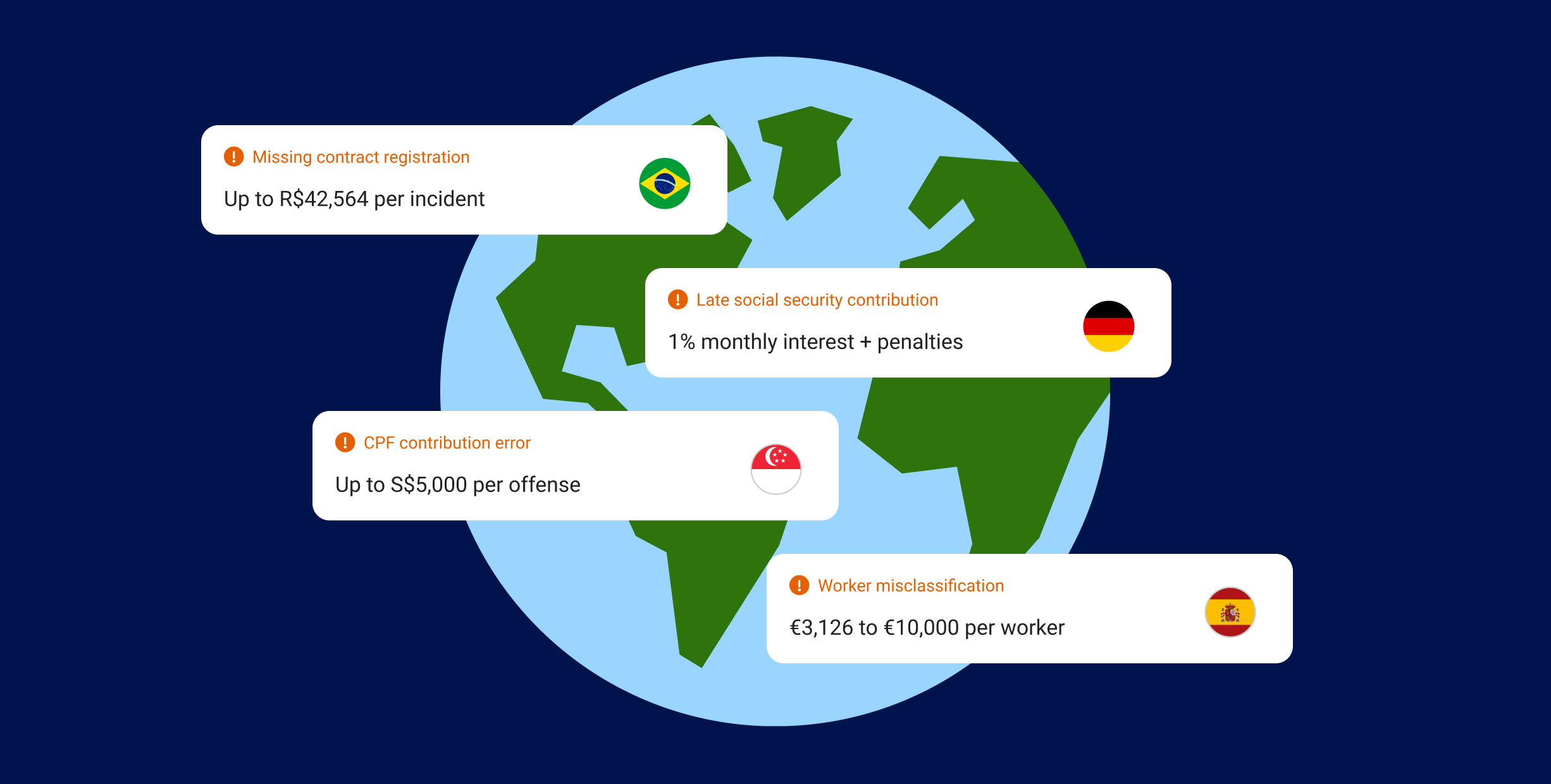When Payroll Mistakes Go Global, So Do the Consequences
Five risks that can derail global growth.

Global expansion sounds like a dream. New markets. New talent. New revenue.But for every team excited about launching in Brazil, Poland, or the Philippines, there’s a finance or HR leader quietly panicking about what it actually takes to run compliant payroll in those regions.The truth is: payroll errors in international teams don’t just cost money — they compound risk. And most companies dramatically underestimate the price they’ll pay for small missteps.This isn’t just about paying someone late. It’s about regulatory fines, employee attrition, lost productivity, and damage to your employer brand — all from mistakes that often start with a spreadsheet.Below, we’ll explore five often-overlooked — and often underestimated — costs of global payroll errors, with examples from real regulations and risks across international markets.
1. Compounding government fines and legal penalties
International payroll doesn’t just involve paying employees — it also involves accurate filings with local tax authorities. And failure to comply can quickly lead to recurring and compounding penalties.In Brazil, for instance, employers must report payroll and employment data through a government-mandated platform called eSocial. Failing to submit required forms or submitting inaccurate data can result in per-employee fines of R$500 or more. For more serious violations, such as failing to register an employee’s contract, fines can reach R$42,564 per incident as outlined in Brazil’s official eSocial guidance.It’s not just Brazil:- In Germany, failing to pay social security contributions on time can result in late-payment interest of 1% per month, plus administrative penalties.
- In Singapore, incorrect Central Provident Fund (CPF) contributions can trigger fines of up to S$5,000 per offense, with potential jail time for directors under repeat or severe violations. This is detailed in the CPF Employer Guidelines.
2. Payment delays that lead to talent loss and brand damage
When international employees or contractors don’t get paid on time, the damage goes well beyond inconvenience.In countries where many workers may rely on prompt payments to meet immediate financial obligations — such as the Philippines, India, Mexico, or Kenya — even a one-day delay can have real-life consequences. This might include missed rent, late fees, or overdraft penalties.The issue is especially pronounced in remote teams. Trust and reliability are critical when employees are operating in different time zones, often without direct contact with HR or finance. If your payroll process breaks — or even appears unreliable — it can quickly erode trust across entire regions.Beyond internal disruption, missed or delayed payments can have external consequences as well:- Inaccurate pay may violate local labor laws or contractual terms.
- Contractors may stop work immediately or walk away from projects altogether.
- Word spreads fast — and poor payroll experiences can surface in Glassdoor reviews, social posts, or Slack communities in that region.
3. Currency exchange errors that inflate costs or trigger compliance issues
Many companies underestimate just how complex currency conversion can get when operating globally — especially when payroll is processed centrally, but paid out locally.For instance, if you fund payroll from your US bank account but need to pay employees in Argentina or Turkey, fluctuations in local exchange rates can result in thousands of dollars in unanticipated variance each month.In highly volatile economies — such as Argentina, where inflation surpassed 100% in 2023 — failing to lock in a favorable exchange rate or account for sudden swings can result in significant overpayments or underpayments.It’s not just about budget planning. Currency errors can create compliance exposure if employees or contractors are consistently paid less than agreed-upon net salary because of conversion losses. In countries like India or Nigeria, foreign currency restrictions and central bank regulations can also delay fund transfers or require documentation your finance team isn’t prepared for.Even in stable economies, currency-related costs add up:- Transfer fees
- Foreign exchange markups from banks
- Delays due to interbank settlement timing
4. Contractor misclassification that leads to back taxes and legal action
Misclassifying international workers is one of the highest-risk — and most common — payroll mistakes.Let’s say you hire a full-time designer in Spain and call them a contractor to avoid setting up a local entity. You give them weekly deliverables, include them in team meetings, and control their hours.According to Spanish labor law, that’s not a contractor. That’s an employee. And under Spain’s falsos autónomos enforcement policy, labor inspectors can reclassify the worker retroactively — requiring your company to pay:- Unpaid social security contributions
- Penalties and interest
- Retroactive employee benefits (e.g. paid time off, severance)
- Legal fees or fines ranging from €3,126 to €10,000 per worker
5. Admin overhead and operational inefficiencies
When payroll errors stack up, the cost isn’t just regulatory or reputational — it’s operational.Many companies try to manage global payroll through a patchwork of:- Local HR vendors or accountants
- Manual spreadsheets and trackers
- Internal Slack threads or email approvals
- Bank wires and currency converters
- Finance and people teams burn hours every week fixing errors or chasing approvals.
- Onboarding grinds to a halt due to inconsistent contracts or unclear payment methods.
- Reporting becomes a manual fire drill every month, with no single source of truth.
How to avoid these risks
Payroll mistakes in international teams often stem from one of two root causes:- A lack of local knowledge
- A lack of operational infrastructure
1. Use a centralized global payroll platform
Choose a platform that can handle both employees and contractors in every market where you operate. Look for:- Local currency payouts
- Built-in tax compliance
- Integrated and localized contracts and benefits
- Automated reporting
2. Stay compliant by design
Your system should track local laws — from CPF contributions in Singapore to 13th-month pay requirements in the Philippines — and flag potential missteps before they happen.3. Avoid patchwork solutions
The cost of stitching together local vendors, spreadsheets, and wires is rarely worth the perceived savings. A unified platform reduces both risk and long-term expense.4. Don’t rely on “contractor” status to go global
If you want to scale internationally without setting up entities, consider working with an Employer of Record (EOR) — not misclassified freelance contracts. EORs help you stay compliant while retaining control over hiring and culture.Final thought: small errors compound fast
Payroll mistakes often start small — a miscalculated exchange rate, a late payment, a missing field in a form.But in global teams, small errors become big problems:- Compounding fines from government agencies
- Distrust from employees and contractors
- Administrative overhead that drains team capacity
- Legal exposure that can stall funding or expansion
Related articles
From startups to beyond, US companies of all sizes use Plane for global payroll, benefits and compliance.
Why We Built Self-Driving Payroll at Plane
In order to meet the evolving needs of global companies, payroll must be able to run itself, so your team can spend time on growing your company.
Why Your Contractor Payment Experience is a Hiring Advantage
How their payment experience can determine whether a contractor recommends you to their peers or declines your next offer.
How Plane Handles Multi-Currency Payments at Scale
Moving money across borders is one of the hardest operational challenges for companies today. But it doesn’t have to be. Here’s how Plane simplifies the process.
